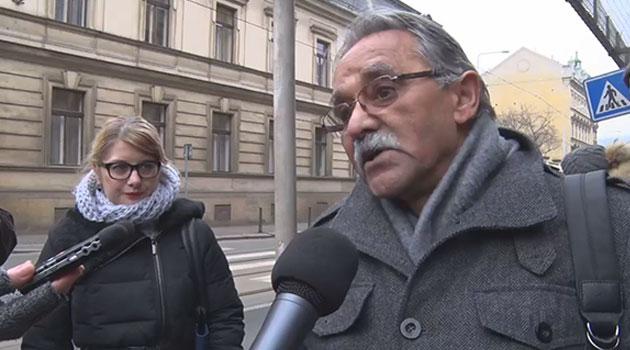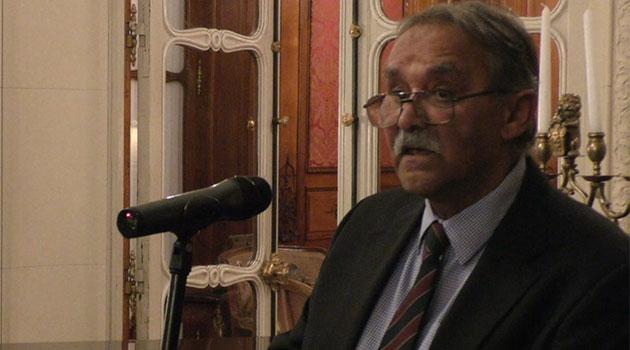Čeněk Růžička reports crime to Czech State Prosecutor, accuses lower house vice-chair of doubting the Romani genocide

The chair of the Committee for the Redress of the Roma Holocaust (VPORH), Čeněk Růžička, visited the state prosecutor today on behalf of the victims and survivors of the concentration camp at Lety u Písku and their relatives to accuse the vice-chair of the Chamber of Deputies, Tomio Okamura, and Czech MP Miloslav Rozner (both SPD), of breaking the law on Holocaust denial. Růžička is not hopeful that the police will be able to press charges, but said he had no choice but to bring the accusation.
The remarks made by both politicians about the concentration camp at Lety u Písku, where Romani people were imprisoned during the war, are the reason the VPORH chair has contacted the authorities and a group of approximately 10 relatives of the victims of the camp are demanding compensation for moral damages. Both politicians, according to the relatives of the victims, have broken the law against publicly denying genocide, in this case the Nazi genocide of the Roma.
“If this succeeds, it would be an enormous signal to all the racists and xenophobes that the Czech Republic has defense mechanisms against this kind of doubting of the Holocaust,” Růžička told news server Romea.cz in front of the state prosecutor’s office in Prague. Okamura said last month that the camp at Lety was never fenced and that people could come and go freely from it.
The vice-chair of the lower house later apologized for alleging that the camp had not been fenced, but immediately went on to say that it had not been guarded most of the time and that people had been able to move about freely inside it. He also said that the accusations of Holocaust denial against him are a campaign against his party.
Okamura has since said that he does not doubt that people suffered at Lety, but that he has reservations about how the remembrance site there is being addressed. His statements have been criticized by the Jewish Community of Prague, the Museum of Romani Culture, and the leadership of the Lidice Memorial, all of whom consider them Holocaust denial.
The Konexe association filed a report of a crime against Okamura last week as well. Růžička said he believes that Okamura’s recent apology was not sincere.
“Okamura is somebody who manages to apologize according to what he needs to achieve,” he said. As for Czech MP Rozner, he has criticized the buyout of the pig farm near the existing remembrance site at Lety and described Lety as a “non-existent pseudo-concentration camp”.
The Young Social Democrats and Czech Senator Tomáš Czernin (TOP 09) filed a report of a crime against Rozner this week and turned out to support Růžička’s efforts this morning. “My mother was imprisoned [at Lety] with her entire family, she lost her father there and her first-born child who was four months old,” Růžička told news server Roema.cz.
“I am personally very affected by this, as is my entire family, and I cannot just let this be,” Růžička said. His mother survived the camps at Lety, Auschwitz and Ravensbrück and gave birth to him in 1946.
Most of his other relatives did not survive the genocide. Outgoing Czech Justice Minister Robert Pelikán (ANO) also objected to Okamura’s remarks this week.
Christian Democratic MPs want to hold a vote at the end of this month on removing Okamura from his post as vice-chair of the lower house. That plan has been supported by the STAN and TOP 09 parties.
Some representatives of the Civic Democratic Party and the Czech Social Democratic Party have not ruled out supporting such a vote either. Those MPs have warned that it is not likely that Okamura will be removed as long as he continues to have the support of ANO, the Communists, and the SPD.
Czech PM Andrej Babiš (ANO) and the chair of the ANO faction in the lower house, Czech MP Jaroslav Faltýnek, said yesterday that Okamura has already sufficiently apologized for his remarks and that therefore they will not support his removal from the leadership of the Chamber of Deputies. Babiš himself said previously that the camp at Lety had just been intended for people who did not work.
After his remarks sparked similar outrage, Babiš later apologized for that remark. According to historians, the camp at Lety was first created in 1940 as a disciplinary labor camp for men who were unable to document their income to the authorities.
People living a traveling lifestyle were also meant to end up in such camps. In 1942 the camp was changed into an internment camp for Romani people.
A total of 1 308 Romani children, men and women passed through the camp, 327 of whom died there, and more than 500 of whom ended up at Auschwitz. The Nazis, according to expert estimates, murdered 90 % of the Bohemian and Moravian Roma.
